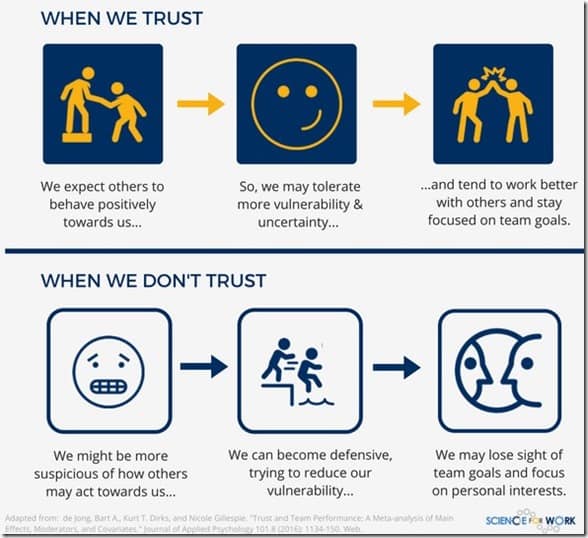When we say “trust” what does that mean?

Trust is not LIKABILITY. A person being “nice” or someone you might like to hang out with on weekends does not define trust. The fact that you “mean well” does not create trust with your team members. As a matter of fact, you don’t really have to like a person in order to trust that person in your work together! (More about that in a future post…)
In contrast, Denise Rousseau suggests this definition of trust:
In other words, Trust = Intentions + Behavior. Stephen M.R. Covey, in his book Speed of Trust, breaks down trust in what he calls “Four Cores”
- Integrity – Being honest, walking the talk, living your values
- Intent – Are you in this for yourself, or for others and for the team? Is your focus short-term or long-term?
- Capabilities – Your talents, attitudes, skills, and knowledge. Do you have the expertise to do your job well?
- Results – Your track record, your performance, and how you value the shared results of the team in relationship to your own individual achievements and recognition
Here is another formula I like, from the ScienceForWork nonprofit foundation:

To drive this home, try this exercise with the team you lead, or suggest it to your manager:
Personal Histories Exercise
In a meeting, go around the room and have every member of the team share these three things:
- Where they grew up
- How many kids, and their birth order in the family
- The most difficult or important challenge of their childhood
Obviously, the first two are factual and easy. The third question is the opportunity to really learn something significant about each person. Patrick Lencioni relates this outcome from a client team he worked with:
A guy hesitated a moment and then explained that when he was eight years old, his twelve-year-old brother was murdered, and that was tough on him. One of his teammates sitting across the table was stunned, and after a moment said, “I’ve worked with you for nine years and I never heard about that.” To which his colleague said, “Yeah, I was just never sure about the right time to bring it up.”
This could be an extreme example. On the other hand, it vividly illustrates the fact that we all have something unique that “makes us human” and makes us who we are. Discovering that about one another, we increase the level of trust, which strengthens the foundation of working together effectively.
What’s the trust level in your team? I would love to chat about that!

